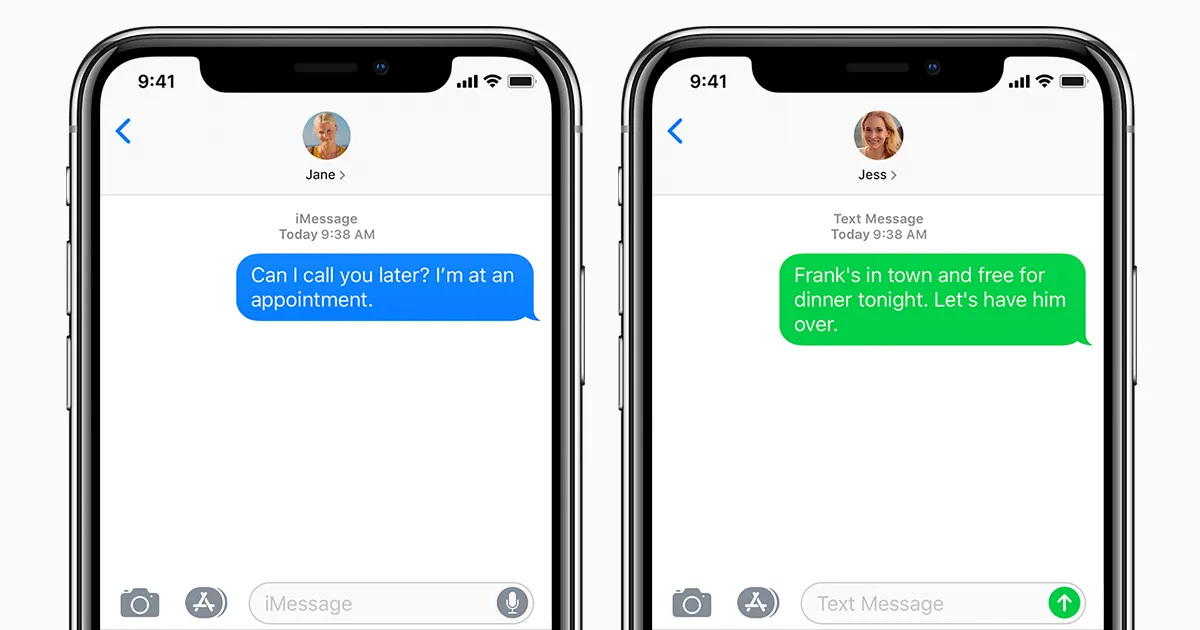Published
2 years agoon

Following a persistent campaign from tech giants Google and Samsung, Apple has conceded ground. Despite this shift, the iconic green bubbles in messaging are here to stay.
As per a report by 9to5Mac, Apple has committed to integrating Rich Communication Services (RCS) messaging into the iPhone by 2024, aligning with the standard predominantly used by Android devices.
This move holds the promise of enabling encryption, reading receipts, typing indicators, and improved media sharing capabilities between iPhones and Androids. Apple clarified that RCS messages will still appear in green, akin to current SMS messages.
Google has long taken potshots at Apple for not supporting RCS, saying the texting experience between iPhones and non-iPhones is so outdated it might as well be using a pager. With RCS support, messages between Android and iOS devices will be more secure (than over SMS), while media can be shared at higher quality.
RCS brings iMessage-style features to cross-platform texts
RCS is a modern messaging protocol that enhances the capabilities of traditional SMS and MMS. It allows users to send and receive messages over mobile data or Wi-Fi, as well as access various media and interactive features.
These features aim to elevate text messaging and put it on par with popular instant messaging platforms like WhatsApp. Apple’s plan also includes enabling users to share locations within messages. Not to mention, RCS has been championed by Google for a long time, as they wanted to create a unified messaging experience for Android users.
RCS Messaging Benefits
Multimedia Exchange: RCS allows sharing multimedia content like images, videos, and audio files within the messaging app, unlike traditional SMS.
Read Receipts: Get notified when your message has been read by the recipient, courtesy of RCS read receipts.
Typing Indicators: See when someone is composing a response with RCS typing indicators.
Real-Time Conversations: RCS supports real-time messaging, fostering more interactive conversations.
Group Chats: The protocol facilitates seamless group chat exchanges.
Rich Media Sharing: Experience enhanced media sharing capabilities with RCS.
Message Reactions: RCS enables adding reactions to messages, enriching the messaging experience.
Apple, however, was reluctant to adopt RCS as it wanted users to stick solely to iMessage. That’s set to change next year with an update that will be rolled out sometime in 2024.
9to5Mac’s Perspective
Until now, Apple had shown no desire to make the changes.
When asked at last year’s Code Conference about the texting technology by an attendee who expressed difficulties with sending videos to the attendee’s mother, Tim Cook, Apple’s chief executive, responded, “Buy your mom an iPhone.”
Notably, the announcement also comes before Europe’s Digital Markets Act (DMA), goes into effect in 2024, which could lead to greater scrutiny of its messaging system. The law will apply to so-called gatekeeper platforms, including Apple, and is aimed at forcing those companies to loosen their grip on the market.
In September, the European Commission opened an investigation into iMessage to determine whether it should be considered a “core platform service”. However, Apple reportedly argued iMessage isn’t popular enough in Europe for the rules to apply, and it’s planning to file an appeal against the government’s regulation of its App Store.
While iMessage won’t directly integrate with other platforms, RCS will supersede SMS and MMS while coexisting independently from iMessage. Apple’s stance on iMessage as a “core platform service” under the DMA remains contentious, triggering regulatory scrutiny and an upcoming appeal by Apple against governmental regulations affecting its App Store.
Google and Samsung get what they desired
Throughout this debate, Google, Samsung, and even Nothing, the company linked to OnePlus co-founder Carl Pei, have actively urged Apple to incorporate RCS. This anticipated shift signifies a welcome change for users grappling with the limitations of cross-platform messaging, offering prospects of better-quality media sharing and heightened security compared to traditional SMS.
Google has actively advocated for Apple’s adoption of RCS to foster connectivity between iPhone and Android users. Employing campaigns like “Get the Message,” Google has sought to promote RCS and encourage Apple’s participation. Utilising social media channels, marketing videos, and engagement with EU regulators, they’ve aimed to exert pressure on Apple to embrace RCS.
Samsung has been instrumental in encouraging Apple’s adoption of RCS by partnering with Google to integrate RCS into their own devices. However, a significant driver behind Apple’s decision may have been the European Union’s actions to address practices that restrict competition and consumer options. For instance, the EU mandated the adoption of USB-C as a standardized charging port across Apple’s devices.
Nothing recently introduced Nothing Chats, an app that allows non-iPhone users to send iMessages as if they are using iPhones. The app, which is in beta mode, replaces the green bubbles with blue ones and allows for group chats, voice notes, high-resolution media sharing and more between those devices.
“If messaging services are dividing phone users, then we want to break those barriers down,” the company’s website reads.
An enhanced messaging experience awaits
While the significance of RCS may vary depending on whether your contacts use iPhones or Androids, this development holds immense importance.
The messaging experience between iPhone and Android users is set to improve significantly. Previously, sharing images and files between Android and iPhone users posed challenges. However, with Apple’s adoption of RCS, this will change for the better. Once both the sender and recipient use RCS-enabled devices, they can leverage enhanced messaging features without relying on third-party applications like WhatsApp or Telegram.
RCS stands out for its encryption capability, offering enhanced security compared to standard SMS/MMS, which lacks end-to-end encryption. However, Apple’s support for RCS may differ from Google’s encryption extension, focusing on a universal encryption method to ensure compatibility with various RCS Universal Profile users.
For most people, they may never notice a difference once RCS is added to iOS, especially if they don’t already text with someone who uses Android. But just because one group of users doesn’t care doesn’t mean it won’t please others.
The tech major has slated this adoption for “later next year,” potentially aligning with the release of iOS 18, traditionally launched in September, although an earlier RCS adoption would be a pleasant surprise.


Deepinder Goyal resigns as Eternal CEO; Blinkit’s Albinder Dhindsa to take the helm


📈 Markets Open Strong : Voltas in Focus Amid Recovery Hopes


Couple attends own wedding virtually after being stranded by IndiGo


IndiGo-ing nowhere: Corporate greed and regulatory failure has grounded a nation


The Preliminary Findings of Air India AI171’s Tragic Crash Paint a Disturbing Picture


Japan’s Petabit Internet Is Faster Than You can Possibly Imagine

